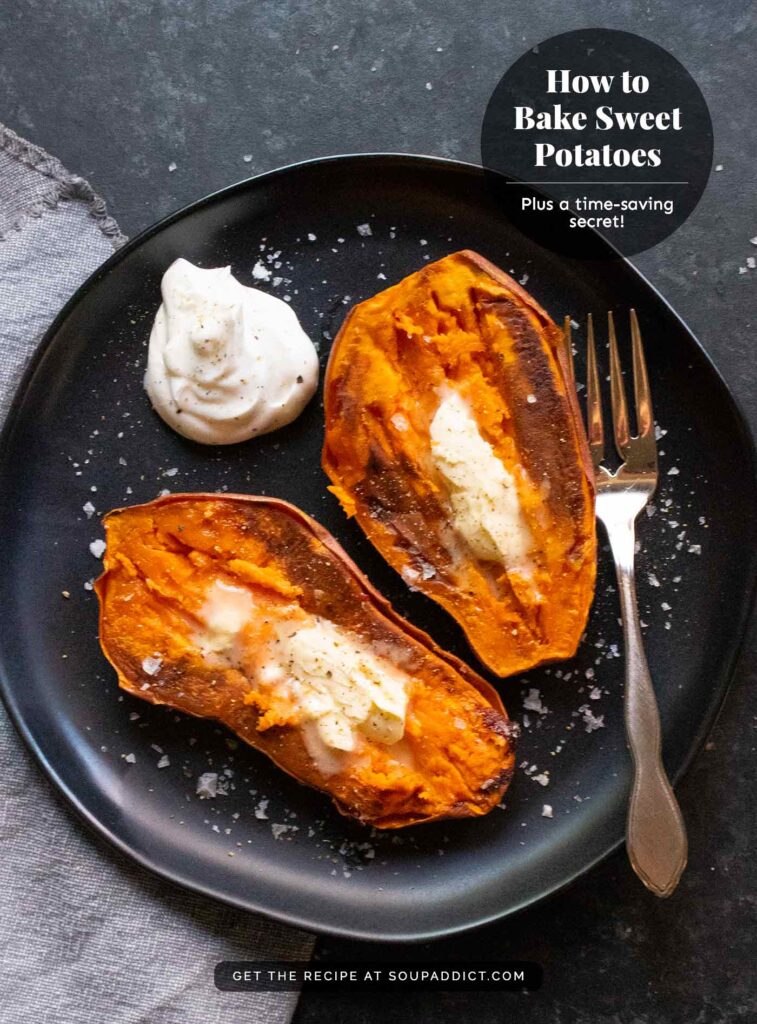Baked sweet potatoes are a true treat of fall, freshly harvested and at their peak of flavor. Roasting a sweet potato heightens its natural sweetness, thanks to a bit of caramelization from the Maillard reaction, and brings out its lovely earthy undertones. Learn how long to bake a sweet potato at 400 degrees to create crispy skin and perfectly tender insides. Also, a super easy shortcut bakes potatoes in half the time!
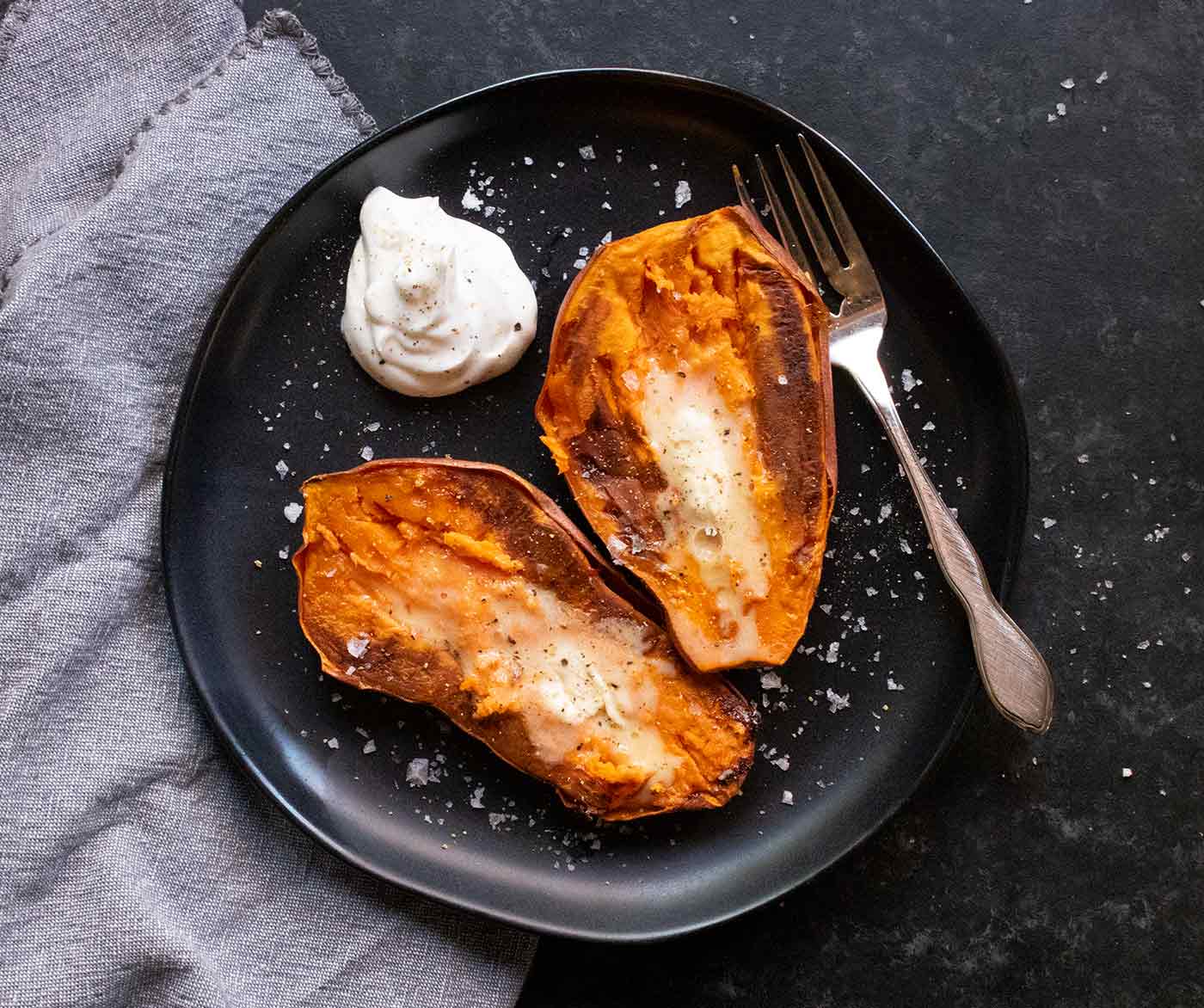
I grow sweet potatoes at home and, along with garlic, they’re one of my favorite crops. They need a lot of room to spread, but they’re low-care plants with gorgeous foliage on their wondrously long vines.
And at the end of fall, you get this:

There are many ways to prepare these autumn gems: in a pressure cooker, mashed in a Thanksgiving sweet potato casserole, stir fried, sautéed and simmered in soup, and more.
But my favorite is baking (or roasting) in the oven. The heat of the oven and direct contact with a hot pan cooks the potatoes to utter bliss: smooth, tender insides with wonderfully crispy skin, and a perfectly baked sweet potato.
The Shortcut
Let’s cut right to the chase. Baking potatoes of any kind in the oven is sort of a pain because they take so long, an hour or more.
But, here’s the secret this sweet potato recipe: slice the potato in half lengthwise, and bake the halves cut-side down on a sheet pan. Literally cuts the time in half: A lovely baked sweet potato in about 30 minutes!
Plus, the sugars exposed on the cut side get a crave-worthy caramelization, thanks to the Maillard reaction. There’s no downside to this method!
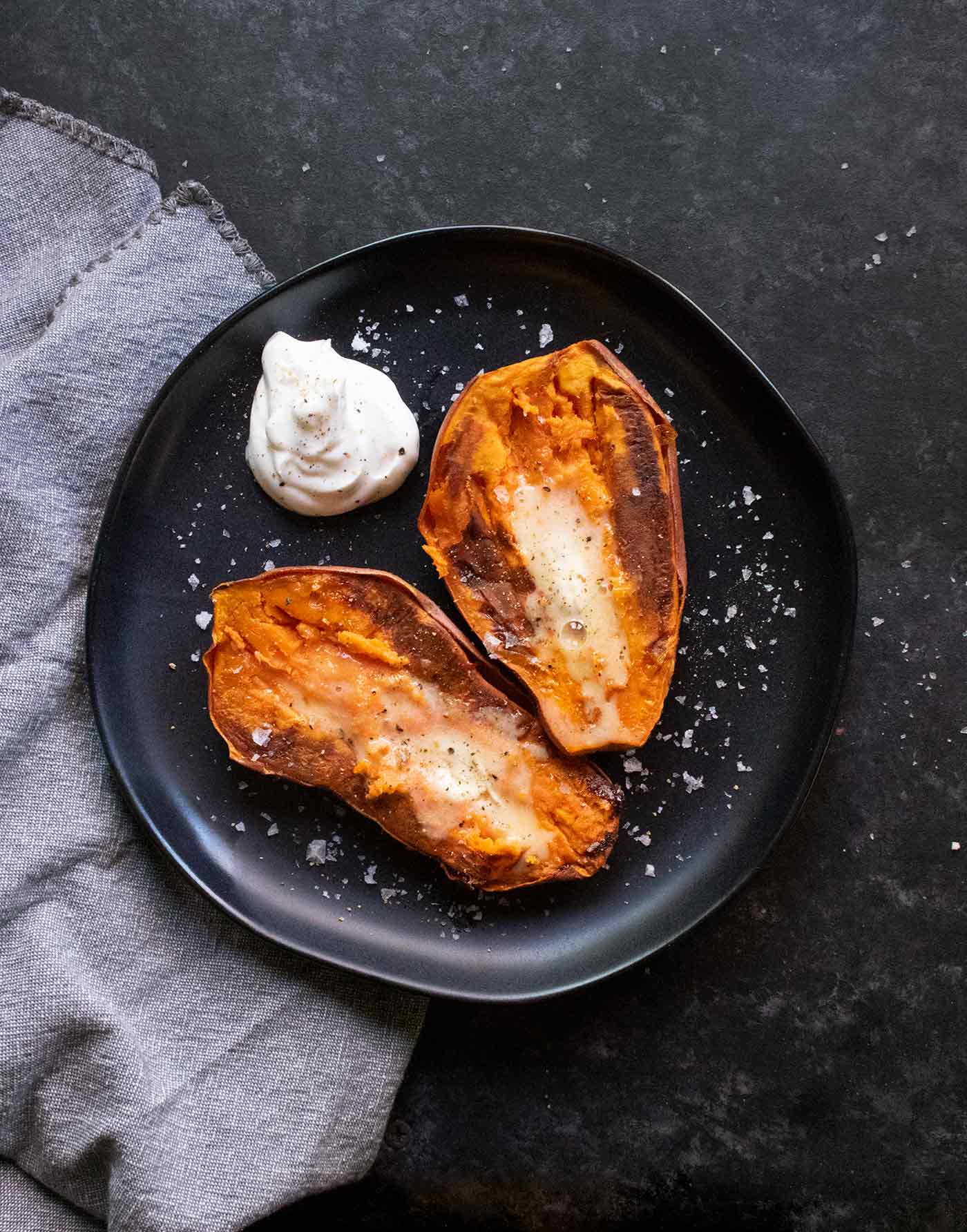
What Kind of Sweet Potatoes to Use?
There are many varieties of sweet potatoes in the botanical world, only a few of which make it to the grocery store.
The light reddish-orange skinned, orange-fleshed sweet potatoes that you find in the bulk bin at the grocery store are usually Beauregards. They’re your all-around workhorse sweet potatoes.
Garnets (dark red skin with orange flesh) have more savory flavors and often grow in shapes that are better for roasting (i.e., long and thin). In general, orange-fleshed sweet potatoes have the most sweetness with silky, creamy centers after cooking.
If you’re lucky, you might find purple-skinned/white-fleshed, purple-skinned/purple-fleshed, or beige-skinned/magenta-fleshed Asian (or Hawaiian) sweet potatoes. These lovely specimens are earthier and, while still sweet, have more savory leanings.
They’re my favorite sweet potatoes, for sure, since I’m a fan of the sweet potato’s earthy richness more than its sweet notes. For this post, I used Garnets, although the baking method applies equally well to all varieties.

How to Choose Sweet Potatoes
The most important consideration when choosing sweet potatoes for baking is uniformity: if you’re baking more than one, select potatoes that are the same size and shape so that they will cook together.
At the grocery store, it’s impossible to know the age of the sweet potatoes they have for sale, so it’s best to give each potato the once over. Sweet potatoes should be firm with no soft spots.
The skins should be smooth, not wrinkly (a sure sign of an older potato). Avoid potatoes that have growths sprouting from the eyes, which means that they have diverted their energy towards creating a whole new plant.
Also be on the lookout for discolorations and large blemishes or scars. Some of them can be cut out without issue, if the pickings are slim, but avoid large flaws over the potato’s surface.
How to Bake Sweet Potatoes
- Heat oven to 400 degrees F and line a baking sheet with parchment paper or aluminum foil.
- Clean, scrub, and pat dry the potatoes with a paper towel. Trim off the ends if they’re gnarly.
- Slice each potato in half lengthwise.

- Rub a generous amount of olive oil or avocado oil over the entire halves, including the cut side.
- Position the sweet potato halves cut-side down on the sheet in a single layer, with an inch more in between. You don’t have to poke holes. They won’t explode!
- Bake in the oven on the lower rack until a fork easily pierces the skin and flesh (see time notes below).
- Remove from oven and carefully flip over. Season with salt and pepper, or whatever seasonings you prefer.

How Long to Bake Sweet Potatoes at 400 degrees
Because the sweet potatoes are halved, they’ll cook much quicker than a whole potato. But, several factors influence the length of the bake. Does your oven hold heat evenly? How far is the sheet pan from the heat source? And most importantly, the size and shape of the sweet potatoes themselves.
Potatoes are anything but uniform and they come out of the ground in all shapes and sizes: long and thin, short and round, a big oval lump. Even from the same plant. Lol.
You can see from my photos in this post that I chose slender, shortish sweet potatoes. Not only are they plenty for a meal, but they cook the fastest.
Whatever size you choose, try to match all of the potatoes that you buy so that they finish in the oven at the same time.
Here’s a quick chart for the cooking time. The sweet potatoes are done when the skin is crispy but not burnt, and a fork or knife slides easily into the potato. Start checking for doneness at the 20-minute mark so they don’t burn.
Small: 25 minutes
Medium: 30 minutes
Large: 35-40 minutes
The sweet potatoes in this post are what I consider “small.”
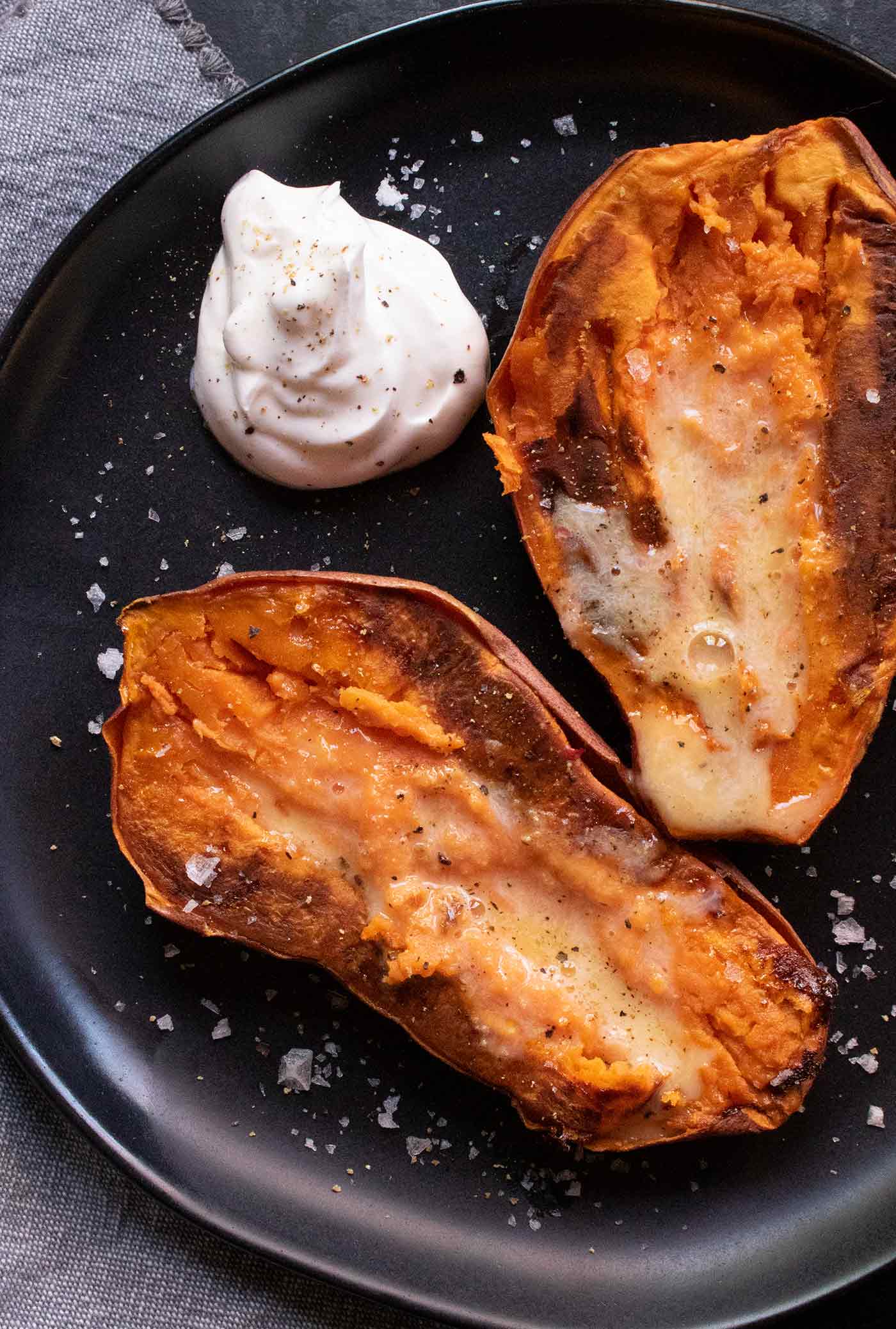
Serving Suggestions
My favorite way to enjoy baked sweet potatoes is to season the cut side lightly with salt and pepper, schmear the top of each sweet potato with a little butter, and add a dollop of sour cream on the side. The tang of the sour cream goes perfectly with the sweet earthiness of the sweet potato.
For a meal-worthy presentation, you could top with black beans, salsa, chopped green onions, and guacamole or sour cream. So delish! Or use your favorite toppings!
This preparation is also lovely in salads and pasta dishes: just carefully slice the baked sweet potato into cubes.
With this time-saving method, I hope you’ll try oven-baked sweet potatoes! They’re the perfect side dish, as well as a healthy side dish!

More Sweet Potato Recipes
- Spiced Sweet Potatoes with Cilantro Sauce
- Savory Sweet Potato Fries
- Sweet Potato Nachos with Guacamole Salsa
- Salt-roasted Sweet Potatoes
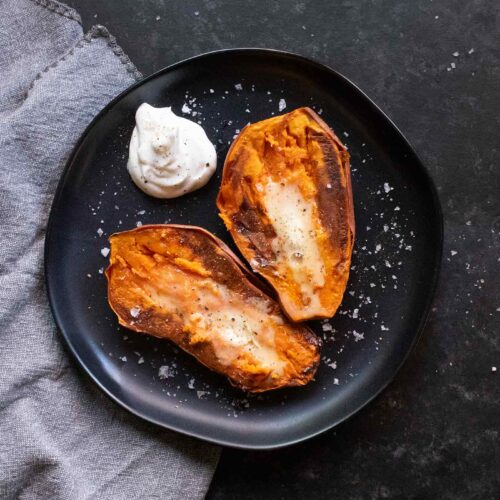
How to Bake Sweet Potatoes
Ingredients
- 3 sweet potatoes scrubbed clean and sliced in half
- extra virgin olive oil or avocado oil.
- salt and pepper
Instructions
- Preheat oven to 400ºF and line a baking sheet with parchment paper or foil (for easy clean-up).
- Rub oil over each sweet potato half, including the cut side.
- Place the halves cut-side down on the baking sheet, with at an inch in between.
- Bake in the oven according to the time chart in the notes below. The sweet potatoes are done when a fork easily pierces the potato. To double-check doneness, turn one over and confirm that the inside flesh is nice and tender. You’ll be able to easily leave imprints with the tines of a fork.
- Remove from oven and carefully flip over.
- Season with salt and pepper.

